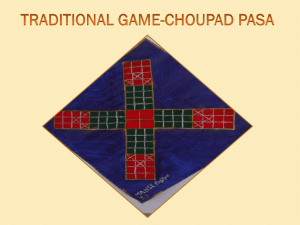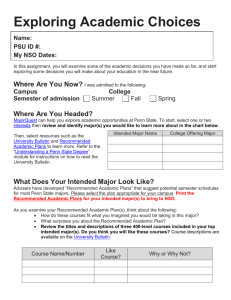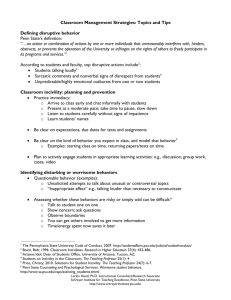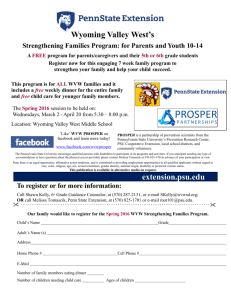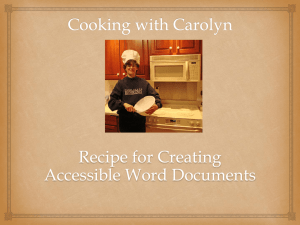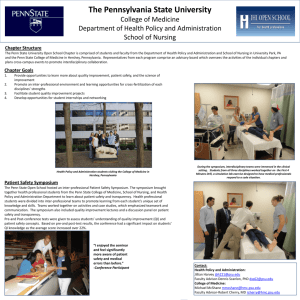2008 - Northeast Sustainable Agriculture Research and Education
advertisement
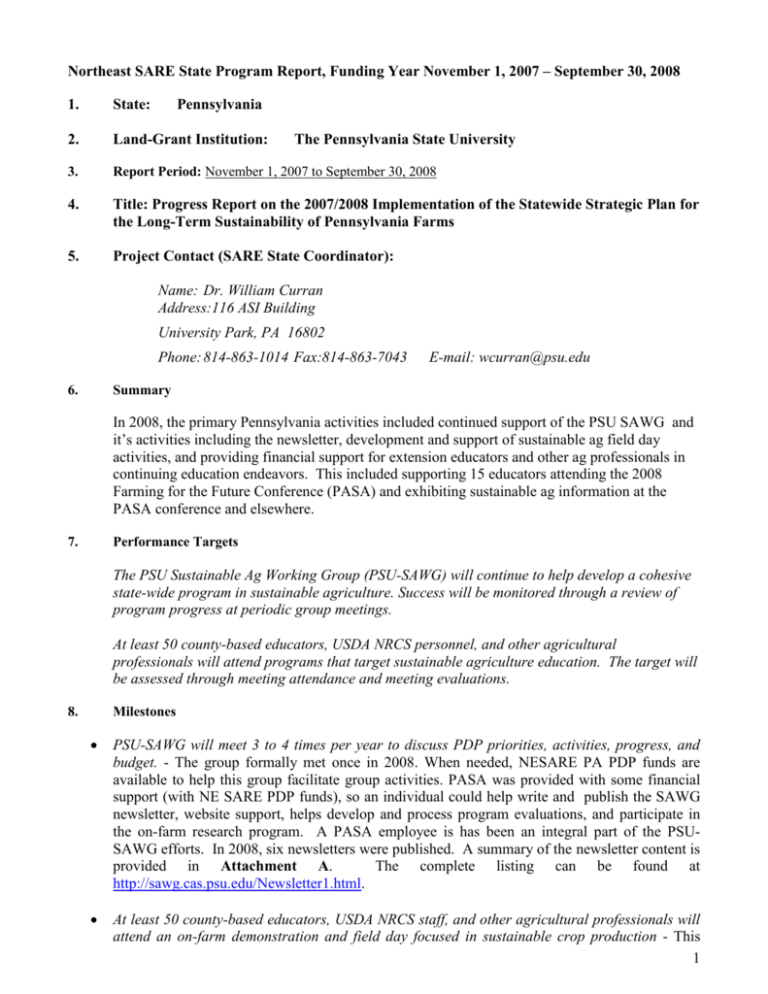
Northeast SARE State Program Report, Funding Year November 1, 2007 – September 30, 2008 1. State: Pennsylvania 2. Land-Grant Institution: 3. Report Period: November 1, 2007 to September 30, 2008 4. Title: Progress Report on the 2007/2008 Implementation of the Statewide Strategic Plan for the Long-Term Sustainability of Pennsylvania Farms 5. Project Contact (SARE State Coordinator): The Pennsylvania State University Name: Dr. William Curran Address:116 ASI Building University Park, PA 16802 Phone: 814-863-1014 Fax:814-863-7043 6. E-mail: wcurran@psu.edu Summary In 2008, the primary Pennsylvania activities included continued support of the PSU SAWG and it’s activities including the newsletter, development and support of sustainable ag field day activities, and providing financial support for extension educators and other ag professionals in continuing education endeavors. This included supporting 15 educators attending the 2008 Farming for the Future Conference (PASA) and exhibiting sustainable ag information at the PASA conference and elsewhere. 7. Performance Targets The PSU Sustainable Ag Working Group (PSU-SAWG) will continue to help develop a cohesive state-wide program in sustainable agriculture. Success will be monitored through a review of program progress at periodic group meetings. At least 50 county-based educators, USDA NRCS personnel, and other agricultural professionals will attend programs that target sustainable agriculture education. The target will be assessed through meeting attendance and meeting evaluations. 8. Milestones PSU-SAWG will meet 3 to 4 times per year to discuss PDP priorities, activities, progress, and budget. - The group formally met once in 2008. When needed, NESARE PA PDP funds are available to help this group facilitate group activities. PASA was provided with some financial support (with NE SARE PDP funds), so an individual could help write and publish the SAWG newsletter, website support, helps develop and process program evaluations, and participate in the on-farm research program. A PASA employee is has been an integral part of the PSUSAWG efforts. In 2008, six newsletters were published. A summary of the newsletter content is provided in Attachment A. The complete listing can be found at http://sawg.cas.psu.edu/Newsletter1.html. At least 50 county-based educators, USDA NRCS staff, and other agricultural professionals will attend an on-farm demonstration and field day focused in sustainable crop production - This 1 past summer, two PSU ag field days took place across the state. In addition, NESARE dollars were used for travel support to attend and participate in a joint PA-MD field day hosted by Mason’s Heritage Farm in Queen Anne’s County, MD. It was a collaboration that included funding from both NESARE and a USDA MD Conservation Innovation grant. The Rodale Institute also participated. The announcement and survey tool are provided in Attachment B and the survey results can be found at: http://www.surveymonkey.com/sr.aspx?sm=2G_2bvT0Kv9P1RCXmFFP37PoB5bas0wPrXHcP 0uXe3qIg_3d. At least 15 extension educators (agents, faculty and staff) will participate in conferences, workshops, or other activities that support sustainable ag education - The Pennsylvania Association of County Agricultural Agents (PACAA) met in June, 2008 at Milton Hershey School’s Agricultural and Environmental Education centers. Sites visited were the Environmental Center, Horticultural Center, and Dairy and Foods Processing Center. Participants of the tour learned the extraordinary opportunities that youth have that attend this school. About 20 PA educators were in attendance. (travel reimbursement and other expenses were provided with PDP funds). – see Attachment C. At least 15 extension educators (agents, faculty and staff) will participate in the annual PASA conference in February 2008 - At the 2008 PASA conference, almost 2000 people attended more than 75 workshops not including the preconference activities. Ninety-four educators from Penn State attended the annual conference. Fifteen extension educators received travel support from PDP funds and helped staff a joint Penn State College of Agricultural Sciences and NESARE exhibit. Sustainable agriculture educational materials from both Penn State and NESARE were displayed over the two-day period. Video’s ran throughout the two days showing USDA SARE videos “Vegetable Farmers and Their Weed Control Machines”, “SARE: Innovations in Agriculture”, and “Farmers and Their Cover Cropping Techniques” plus a number of other videos. PDP funds were used to support this activity. In addition, extension educators nominated farmers that either had not attended the conference before or would not have been able to attend the conference without the support and 9 farmers received scholarships to help support their attendance to the conference. Comments from educators are provided in Attachment D. . Penn State and NE Region SARE sustainable ag education and programming information will be displayed at appropriate conferences and workshops – Sustainable Ag and USDA SARE publications and information was displayed at a number of extension meetings including the PASA conference, sustainable ag field days, and Ag Progress Days, a 3-day ag fair that attracts over 100,000 people. 9. Performance Target Verification Evaluations using several formats were used over the last year to evaluate success with different programs. Results are provided in Attachments C, D, & E. 2 BENEFICIARY FORM Northeast SARE State Program Funding Year-End Report, Nov. 1, 2007 – Sept. 30, 2008 _______________Penn State University_________________ Institution Number of Beneficiaries 2 10 10 2/8-9 State College, PA 94 June 2527 Hershey, PA 20 6 annually statewide 100 25 Other 1 25 Farmers PSU-SAWG Newsletter2 5/22, 7/2, 7/10 Queen Anne County, MD, Landisville, PA, Rocksprings, PA Industry PA Extension Educator Annual Meeting Non-Profit PASA annual conference1 Location (City/ State) USDA Sustainable ag field day activities Date Extension Activity 50 50 25 100 100 Only includes Penn State Educators. Other attendance information was not available. Approximate breakdown. 3 Attachments (PA) Attachment A. 2008 Sustainable Ag Newsletter Content January, 2008 http://sawg.cas.psu.edu/PDFs/January2008.pdf In this issue: Edamame: High Value Potential for PA Farmers Opportunity for Agricultural Experience in Africa Pennsylvania NRCS Environmental Incentives Program (EQIP) for Specialty Crops in 2008 MSU Receives $3.5 Million Kellogg Grant to Develop Pasture-Based Dairy Program Tips for Using Compost Census Gives Farmers A Voice in their Future New Courses Offered at Penn State Sustainable Ag Field Days, Workshops, Meetings & Conferences Sustainable Ag Funding Opportunities Sustainable Ag Learning Resources March, 2008 http://sawg.cas.psu.edu/PDFs/March2008.pdf In this issue: Cover Crop Combinations of Varying Seeding Rates & Subsequent Cash Crop Yields Organic Certification of Research Sites & Facilities Gates & Kellogg Foundations Join Forces in Support of Local Food Enterprises European Study Finds Organic Food More Nutritious than Conventional Pennsylvania Certified Organic Has Moved Sustainable Ag Field Days, Workshops, Meetings & Conferences Sustainable Ag Funding Opportunities Sustainable Ag Learning Resources May, 2008 http://sawg.cas.psu.edu/PDFs/May2008.pdf In this issue: Biological Fungicides and Bactericides: Using Fungi & Bacteria for Disease Management 4 Organic Ridge Till Vegetables Growing New Farmers Project & Resources Sustainable Ag Student Sustainable Ag Field Days, Workshops, Meetings & Conferences Sustainable Ag Funding Opportunities What We're Reading Sustainable Ag Learning Resources July, 2008 http://sawg.cas.psu.edu/PDFs/July2008.pdf In this issue: New Marketing Opportunity for PA Organic Grain Growers Northeast Food & Farm Network Focuses on Sustainable Food Systems Study to Examine Link Between Sustainable Farming & Health PA Farmland Preservation Board Approves 58 Additional Farms New Course: Ecology 597 National Harvest Awards Sustainable Ag Field Days, Workshops, Events, Meetings and Conferences Sustainable Ag Funding Opportunities Sustainable Ag Learning Resources September, 2008 http://sawg.cas.psu.edu/PDFs/September2008.pdf In this issue: Research Focuses on Organic Consumers, Retailers, and Manufacturers Sustainable Ag Student: Dara Bloom Pest Forecasting Network New Courses at Penn State Weed Control: Flaming vs. Rotary Hoeing Tools Designed for Women Spotlight on Soils 5 Dig It! Secrets of Soil Sustainable Ag Field Days, Workshops, Meetings & Conferences Sustainable Ag Funding Opportunities Sustainable Ag Learning Resources October, 2008 http://sawg.cas.psu.edu/PDFs/October2008.pdf In This Issue: Creating a Community Garden at PSU: A Year's Worth of Work in Review Photos Sought for Exhibit at Farming for the Future Conference Sustainable Farm Field Day Report: Dairy and Diverse Livestock, Value-Added Production & Marketing at Triangle Farm Urban Farmer Will Allen of Growing Power, Recipient of a MacArthur "Genius Award" The Good Food Neighborhood: Local Foods Program for Consumers Sustainable Ag Field Days, Workshops, Events, Meetings & Conferences Sustainable Ag Funding Opportunities Sustainable Ag Learning Resources Produced by the Penn State Sustainable Ag Working Group (PSU-SAWG), a multidisciplinary group that includes Penn State College of Agricultural Sciences personnel, farmers, and representatives from governmental and non-governmental organizations that support sustainable agriculture. Also available at http://sawg.cas.psu.edu. 6 Attachment B. Organic No-till Field Day announcement and survey tool 7 ORGANIC NO-TILL FIELD DAY MASON’S HERITAGE FARM Thursday, May 22, 2008 Hosted by: NE SARE, USDA-NRCS, Penn State University Cooperative Extension, Rodale Institute, University of Maryland Cooperative Extension, Maryland Department of Agriculture, University of Maryland Wye Research and Education Center PROGRAM EVALUATION FORM In order for us to serve you better and improve our programming, please take a few minutes to answer this brief evaluation form. Thank you! Did you learn anything in this training about: Dave Wilson, Ron Hoover, & Bill Mason Cover crop selection Planting considerations Challenges of increasing nitrogen in the system: legumes vs. animal manures Effect of tillage on soil quality Timing for rolling/crimping legume cover crops Bill Curran and Ruth Mick Timing of weed species emergence and management considerations Control of cover crops with a roller/crimper Use of cover crops and weed control Update of roller/crimper research in progress Jennifer Rhodes and Tony Riggi Organic Grain Crop Budgets Organic Transition Cost Share Maryland Cover Crop Program Gave me considerable new information Gave me some new information Reinforced what I already knew 3 2 1 3 2 1 3 2 1 8 Bill Mason 3 2 1 3 2 1 Demo of roller/crimper and no-till drilling of soybeans in cereal cover crops Question & Answer Session 1. How did you find out about the Field Day? (Circle one) Newsletter Newspaper 2. Are you an Organic producer? Friend Yes Other No 3. If yes, what types of crops to you produce? ____________________________________________________________________________________ ____________________________________________________________________________________ ____________ 4. If no, do you plan on becoming an organic producer - what type of crops? ____________________________________________________________________________________ ____________________________________________________________________________________ ____________ 5. How would you rate the field day overall? (circle one) poor 1 2 3 4 5 excellent 6. Please rate the field day on the following items: (circle one number for each item) 7. a. Content of little use 1 2 3 4 5 useful b. Organization poor 1 2 3 4 5 excellent c. Creating interest in topic boring 1 2 3 4 5 stimulating d. Involvement of participants poor 1 2 3 4 5 excellent e. Pace of delivery inappropriate 1 2 3 4 5 appropriate f. Materials, handouts of little help 1 2 3 4 5 helpful What did you gain from this field day? (check all that apply) a. _____ Answers to my questions b. _____ Resource materials I can use c. _____ Ideas I can try immediately d. _____ Names of other people to contact e. _____ Nothing new f. Anything else? ________________________________________________________ 9 8. How much of the content of this field day did you already know? (check one) a. Nothing _____ b. A little _____ c. Quite a bit _____ d. Most of it _____ e. 9. Will you change any of your practices on your farm as a result of this field day? _____ Yes _____ No 10. If yes, please list changes you will make to your farming operation. ____________________________________________________________________________________ ____________________________________________________________________________________ ____________________________________________________________________________________ ____________________________________________________________________________________ ____________________________________________________________________________________ ______________________________ 11. Suggestion of topics and/or speakers for next field day? ____________________________________________________________________________________ ____________________________________________________________________________________ ____________________________________________________________________________________ ____________________________________________________________________________________ ____________________________________________________________________________________ ______________________________ Thank you! It is the policy of Maryland Cooperative Extension that no person shall be subjected to discrimination on the grounds of race, color, gender, religion, disability, age or national origin. 10 Attachment C. The Pennsylvania Association of County Agricultural Agents Annual Meeting 11 President J. Craig Williams Courthouse Annex 118 Main Street Wellsboro,PA 16901- 1495 Phone: 570.724.9120 Fax: 570.724.6819 President Elect Tim Elkner 1383 Arcadia Lane, Room 1 Lancaster, PA 17601-3184 Phone: 717.394.6851 Vice President Susan Alexander Parker P. Blood Block 180 Main Street Brookville, PA 15825-1234 Phone 814-849-7361 Fax 814-849-3106 Secretary Susan Boser 2020 Beaver Avenue, Suite 200 Monaca, PA 15061 Phone: 724.774.3003 Fax: 724.774.0971 Treasurer Alan Michael 1451 Peters Mountain Road Dauphin, PA 17018-9504 Phone: 717.921.8803 Fax: 717.921.0135 Past President Donald Fretts Ground Floor, County Building Uniontown, PA 15401-3514 Phone: 724.438.0111 Fax: 724.430.3063 Membership Secretary Amber Lemin RR4, Box 167B6 Fairgrounds Road Huntingdon, PA 16652 Life Member Representative Duane G. Duncan 49 “E” Street Carlisle, PA 17013 Phone: 717.243.8069 Directors Capital Region: Gregory Martin 1383 Arcadia Lane, Room 1 Lancaster, PA 17601-3184 Phone: 717.394.6851 Delbert Voight 2120 Cornwall Rd Suite 1 Lebanon, PA 17042 Phone: 717.270.4391 Central Region: Craig Altemose Willowbank Building, Room 322 420 Holmes Avenue Bellefonte, PA 16823 Phone: 814-355-4897 INVOICE July 3, 2008 TO: Penn State / NE SARE Bill Curran Coordinator We would like to thank Penn State University and NE SARE for sponsoring our Annual Spring Improvement meeting for the Pennsylvania Association of County Agricultural Agents. ( PACAA) Your committed support of $1000.00 provided for a successful tour and workshop expenses. The tour for this year’s program was to the Milton Hershey Schools AEE (Agricultural Environmental Center: http://www.mhspa.org/programs/academics/aee/ ) Extension educators learned of the mission of the school and saw first hand how the students are learning and applying agricultural information from the horticultural center to the environmental center and created wetlands to the dairy barn. Students grow and harvest fruits and vegetables for sale at the school’s roadside market as well as assisting in vegetable research trials conducted at the farm. Karen Vines 312 Ag Sci & Ind Bldg University Park, Pa 16802 Phone: 814.865.3097 Please send a check payable to PACAA to Alan Michael, Treasurer. Alan Michael 1451 Peters Mountain Road Dauphin, PA 17018-9504 Northeast Region: Mark Madden R R 2, Box 2022A University Park Dushore, PA 18614-9704 Thank you. Sincerely, Linda Wiles 724 Phillips Street, Suite 201 Stroudsburg, PA 18360 Phone: 570.421.6430 Southeast: Andrew Frankenfield 1015 Bridge Rd, Suite H Collegeville, PA 19426-1179 Phone 610.489.4315 Susan Alexander PACAA Vice President Dwane Miller 1202 Ag Center Dr Pottsville, PA 17901 Phone: 570.622.4225 West Region: Bill Chess Courthouse, Court Street New Castle, Pa. 16101 Phone: 724-654-8370 Robert C. Pollock 827 Water Street Indiana, PA 15701-1755 Phone: 724.465.3880 12 Travel Scholarship/Training Event Follow-up Survey Northeast Region SARE Professional Development Program Applicant Name: PACAA – Pennsylvania Association of County Agricultural Agents; Susan Alexander, vice president___ Phone: ____814-849-7361________________ Email: __skm3@psu.edu__ 1. What did you learn from attendance at this conference/event? This event was a tour of the Milton Hershey School’s Agricultural and Environmental Education centers. Sites visited were the Environmental Center, Horticultural Center, and Dairy and Foods Processing Center. Participants of the tour learned the extraordinary opportunities that youth have that attend this school. Students learn through a combination of laboratory, classroom, barns, greenhouse, and other hands-on activities. The students are provided with the opportunity to learn about the diversity and value of agriculture while developing an understanding of agriculture as it applies to our society. 2. How have you used information learned at conference/event in your work? Shared the information with co-workers as to what is offered at the school and encouraged them to tour the facility if the opportunity arises. Report will be shared with full membership of PACAA at fall professional improvement meeting. 3. What was the most meaningful part of your experience at this conference/event? Learning the mission of the school and that they are reaching out to young people to educate them on where and how food is grown and harvested. The mission of Agricultural and Environmental Education (AEE) at Milton Hershey School is to support student success by engaging children and adults in experiential, land-based learning. 4. Would you recommend this conference/event to others? Definitely YES. 13 Attachment D. Educator comments from the 2008 PASA conference Travel Scholarship/Training Event Follow-up Survey for 2008 PASA Conference (N=9) 1. What did you learn from attendance at this conference/event? 1. More about cover crops, reducing energy consumption on the farm, alternative energy crops, pasture management, improving habitat for native pollinators 2. Organic Veggies- good overview by Ruth Hazzard of all organic options available for pest management in most of the major crops. Weeds-Had seen presentation about this at last year’s conference. Wanted to build on this knowledge of successes and the research being done out west on this topic. 3. New techniques in pastured poultry production, marketing techniques for pastured meats, needs for women in ag. 4. that much of beef cattle grazing is an art of balancing pastures and pasture rotations with the needs of the livestock at that time and the needs of maintaining and improving the pasture. Also the message from the keynote speaker on persevering in spite of obstacles was very inspirational. 5. The PASA conference attendance has increased to over 2000 people. Also a good representation of exhibitors. 6. The first day I learned about the art of cheese making, including the costs and considerations involved. The second day I learned the role that PASA is playing in helping American farmers use more sustainable farming practices. I also learned about the benefits and costs of valueadded products. 7. The diversity of participants at meeting such as this and the wide range of knowledge from these folks. 8. I learned about the importance of fermentable fiber in meat goat’s diet and how grazing forages will affect those levels. 9. Many diversity lessons. 2. How have you used information learned at conference/event in your work? 1. Implement and demonstrate energy savings techniques on the farm, how to improve use of pastures and grass systems, techniques to improve native pollinator services. 2. Recommendation to farmers in pest control. I bought the DVD and will be incorporating it in my Grazing School, more to teach about animal behavior rather than weed control. I also will loan out DVD to interested growers (out a note in my Grazing Newsletter about the We’d Eat it video) 3. I have used the information to plan field days and workshops for women in ag. 14 4. Will use it in several of my programs. 5. Mainly an awareness, I plan to share the information with small/part-time clientele. 6. I plan on helping farmers who have questions related to cheese production or any other valueadded product. I feel more confident in my ability to answer questions and give advice in the area of value-added. 7. Not yet. 8. I will use the information as I answer questions posed by participants in the sheep home study course or the meat goat home study course. 9. Advised clients about marketing techniques they might utilize that worked from some of the presenters. 3. What was the most meaningful part of your experience at this conference/event? 1. Networking with others of similar interests, learning about resources for reducing energy use in ag. 2. Board participation. It is my last year in this role and it was sad but good for me to think about this transition. 3. Meeting with PA-WAgN members to discuss the opportunities and obstacles they are facing this year. 4. Keynote address, trade show displays, excitement and positive attitudes that prevail at the conference. 5. Keynote speaker and good representation of exhibits. 6. Getting to meet many people who are currently involved in the field of sustainable agriculture and value-added was very beneficial and meaningful. I now have several people I can use as contacts if I have a question or need advice. 7. Listening to participants questions and concerns during the sessions. 8. Networking with other sheep/goat producers and viewing how different breeds of sheep will affect a finished wool product. 9. Networking with producers. 4. Would you recommend this conference/event to others? 1. Yes, including those in more mainstream agriculture. There are a lot of things that conventional growers can learn here. 2. Yes 15 3. Yes, it was extremely valuable. 4. definitely – I have been 5. yes 6. yes 7. yes 8. Yes, very interesting, informative, and beneficial conference. It was a real eye-opener. 9. yes 5. If you gave a talk or conducted a workshop, field day, etc. as a result of what you learned, please indicate the date and location of the event and the number of people who attended in each of the categories below: 1. Grazing in Berks Newsletter (pasture newsletter), published info about the DVD, available for check out by producers, February 2008, N=250 2. Planned a summer 08 field day based on WAgN discussions in Greene County for extension and university staff and farmers on “frugal holistic farming. 3. Conducted program in Monaca, PA program for extension staff and nonprofits, Feb. 2008, N=14. 16

